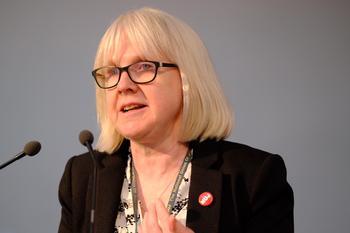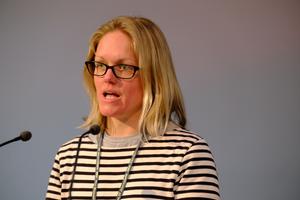DM2023: freelance issues
The appalling rates offered to freelances were discussed by delegates.

“You would have to be living and working on Mars not to have noticed how much content nowadays is behind pay walls,” Sara Lewis of Brussels branch told delegates.
While that may be a good thing in terms of the sustainability of employers and therefore journalists’ jobs, it created big problems for journalists who no longer worked for the organisation concerned, she said.
She recalled a colleague who was given 24 hours notice of redundancy and told there would no longer be free access to content they had created. Accessing cuttings was the last thing on the journalist’s mind. Sara pointed out that it should be possible to get hold of one’s own work to present to other employers without paying to get a past a paywall. The NEC was instructed to lobby to make it standard practice globally to give former employees access to their work.
Delegates instructed the union to mount a Pay Up For Freelance Journalism campaign to reverse the drastic decline in freelance earnings and to make major efforts to include pay rises for freelances in all agreements with media employers. As part of the initiative employers who imposed real terms pay cuts of 50 per cent or worse on freelances since the 1990s would be ‘named and shamed’.
The campaign should emphasise the need to increase overall freelance budgets. Alliances should be formed with ‘like-minded’ organisations who share the NUJ’s objectives. Chapels should also be facilitated in bringing together relevant freelance contributors to participate in drawing up pay claims to ensure freelance issues are addressed.
Proposing the motion, the Freelance Industrial council reported the fact that the New Musical Express had paid 10p a word in in 1992 and in 2000 it went up to 12p, which is where it has remained.
David Gow, Edinburgh Freelance branch, said that during his time covering the miners’ strike in 1984-85, it was a viable option for journalists to set up on their own. That was clearly no longer the case.

For the NEC, Sian Jones lent her support, pointing out that a lot of freelance journalists had supported the industrial action taken by staff journalists at Reach. Delegates heard that some freelance journalists working for BBC local radio who had been working for the corporation for more than a decade, were still on the entry rate, but were too frightened to ask for the full rate.
Conference also called on the NEC to back journalists working abroad in conflict zones such as those on the ground in Ukraine. Conference heard how one delegate was asked to make a contribution to a major radio station from Kyiv at 1am in return for a fee of £35. Other journalists were being paid £50 an article. Michelle Stanistreet, general secretary, offered her full backing on the part of the NEC, pledging it would be taken on as a workplace issue.
The Photographers’ Council won the backing of delegates for raising the awareness among the trade union movement of the increasing importance of freelance practitioners in the industry. The NEC is instructed to get best practice from the TUC and trade unions and use it to produce guidance for communication professionals on copyright and types of licences.
A Magazine and Books Branch motion noted that the present economic situation was detering younger members from joining pension schemes as they became unaffordable, as in the cases of the Reed Elsevier scheme. The union has been committed to lobby for better pensions, including for freelances.
